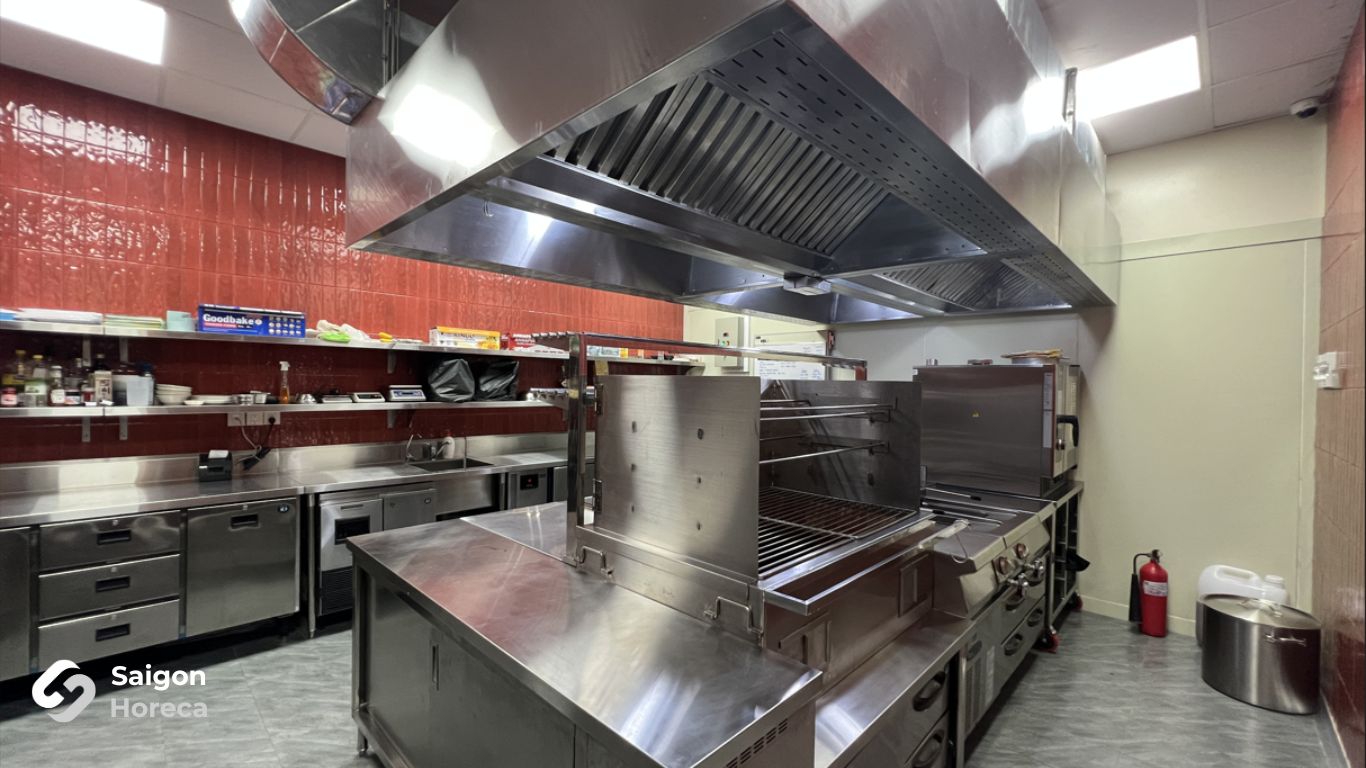In the restaurant business, the kitchen isn’t just a place where food is prepared—it’s the heart of the entire operation. […]
Read More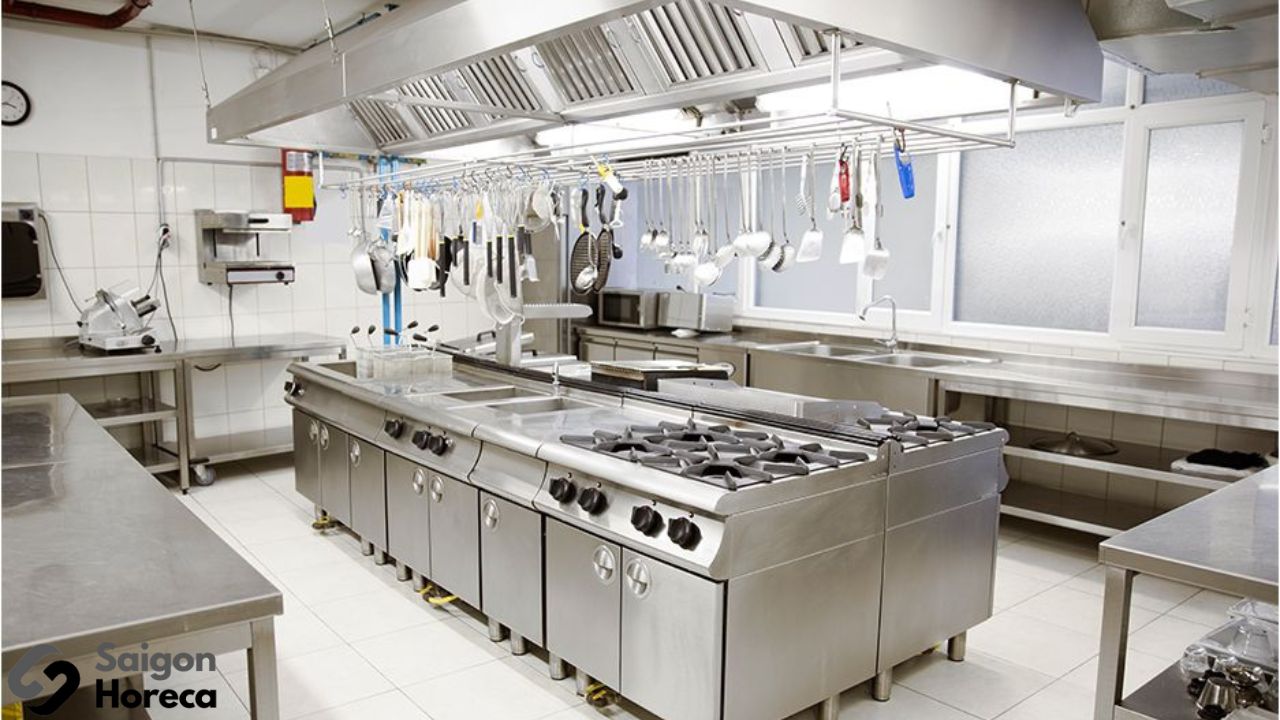

- Industrial Kitchen Equipment, Kitchen Equipment by Business Model
10 Food Safety and Hygiene Principles for Industrial Kitchen Systems
- November 1, 2023
In an increasingly developed human society, the need for food safety and hygiene is becoming crucial at the international, national, and regional levels. Every day, thousands of people worldwide face preventable illnesses caused by food. Foodborne illnesses pose a significant challenge in both developed and developing countries, placing considerable pressure on healthcare systems. The most vulnerable groups include children, the elderly, and those with existing illnesses. Besides the health impact, foodborne illnesses also result in economic losses and affect a nation’s development and international trade.
Food can become contaminated at any point before consumption. Therefore, adhering to food safety principles can help prevent a substantial portion of foodborne illnesses.
In this article
Food Safety and Hygiene: An Inseparable Connection
Understanding the essential value of food in human life, we must recognize that ensuring food safety and hygiene is not limited to the cooking process but begins from food procurement and food preparation.
Failure to adhere to food safety principles can lead to serious health risks. Common illnesses resulting from food contamination or poor hygiene practices include food poisoning, flu, allergies, and, in severe cases, can even lead to cancer.
By following the 10 guidelines below, we can promote a healthier and happier life.
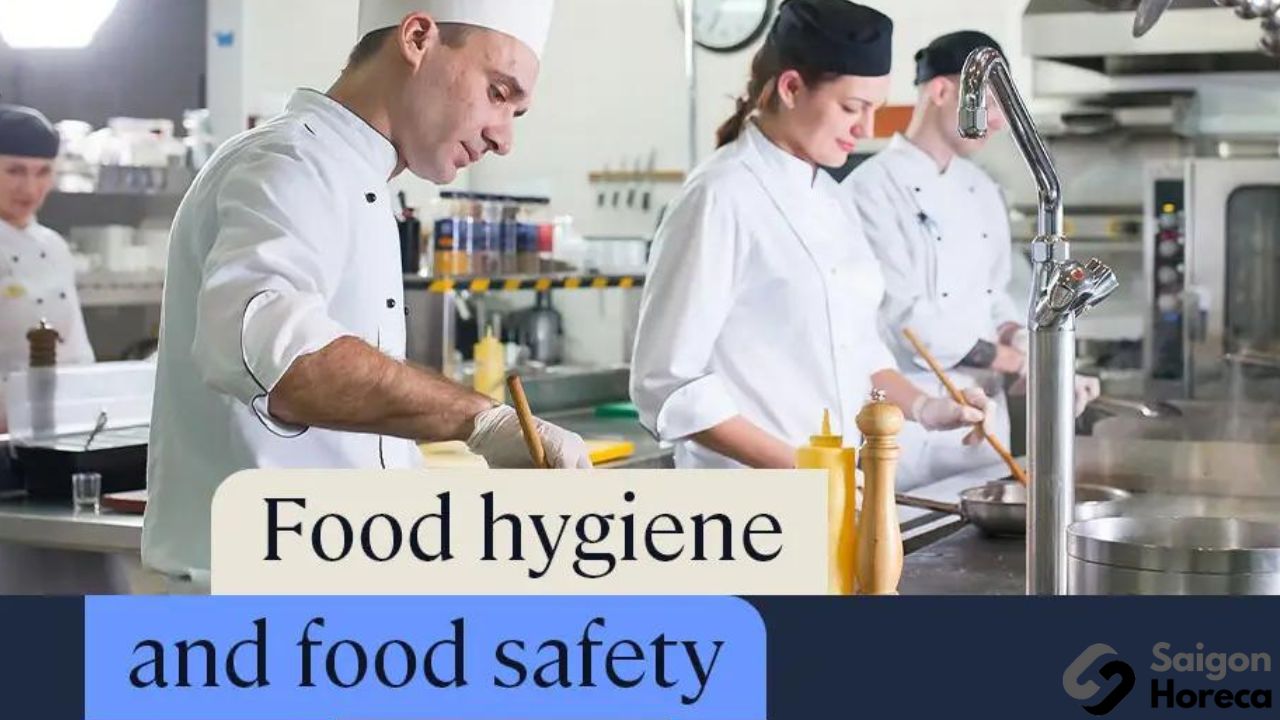

10 Food Safety Principles for Industrial Kitchen
Industrial kitchens typically serve hundreds or even thousands of meals daily. Ensuring food safety in such environments is of utmost importance as it directly impacts the health of a significant number of consumers. When hygiene is not maintained correctly, industrial kitchens can become a breeding ground for harmful bacteria, pathogens, food poisoning, and other communicable diseases. This is why strict adherence to food safety principles, especially in industrial kitchens, is crucial and irreplaceable.






Personal Hygiene: A Crucial Step in Industrial Kitchen
Kitchen staff play a pivotal role in ensuring food safety. In the restaurant’s food preparation area, they are the ones directly handling and utilizing industrial kitchen equipment to prepare delicious meals. Therefore, their personal hygiene is not only vital for their health but also for consumers’ safety.
To eliminate potential risks, kitchen staff should adhere to handwashing with antibacterial soap and maintain personal hygiene throughout the cooking process. This habit significantly reduces the risk of spreading illness-causing bacteria like E. Coli, Salmonella, and other harmful pathogens.
Proper handwashing, following the guidelines provided by the Ministry of Health, is an essential part of ensuring food safety. This is especially crucial before and after handling food, particularly when dealing with sensitive ingredients such as raw meat, fish, or eggs. This ensures that food is prepared in a clean and safe environment.
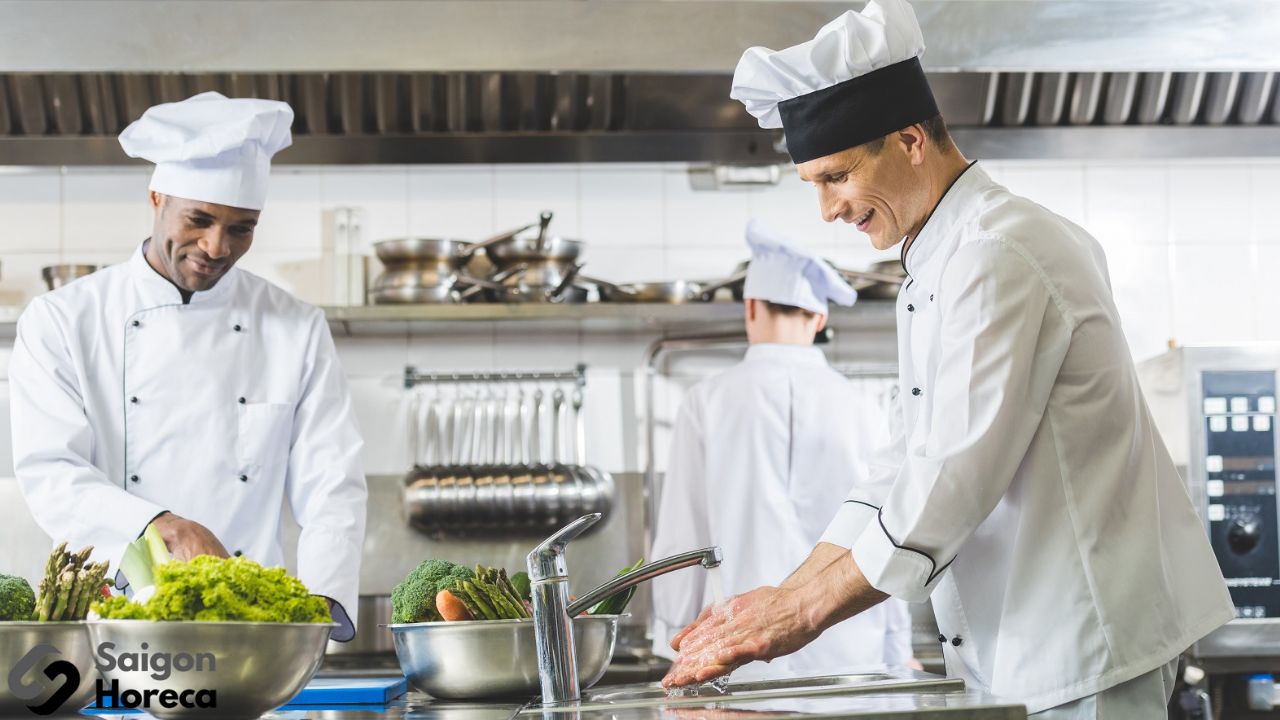

Safe Food Storage
Food is the heart of any kitchen. Properly storing food ensures its freshness and is crucial in preventing the proliferation of harmful bacteria and pathogens. Here are some basic principles for safe food storage:
- Food, especially fresh produce, should be tightly wrapped and stored at low temperatures to maintain freshness and prevent bacterial intrusion.
- Cooked food should not be left at room temperature to prevent contamination. Ensure that cooked food is wrapped securely before placing it in the refrigerator or cold storage.
- Fresh produce should not be stored in cold storage for extended periods, with a maximum of 7 days.
- Organize industrial refrigerators or cold storage correctly. This ensures rotation and reduces the risk of cross-contamination between different types of food. Do not store meat in the same area as fruits and vegetables, and always follow cleanliness and positioning principles.
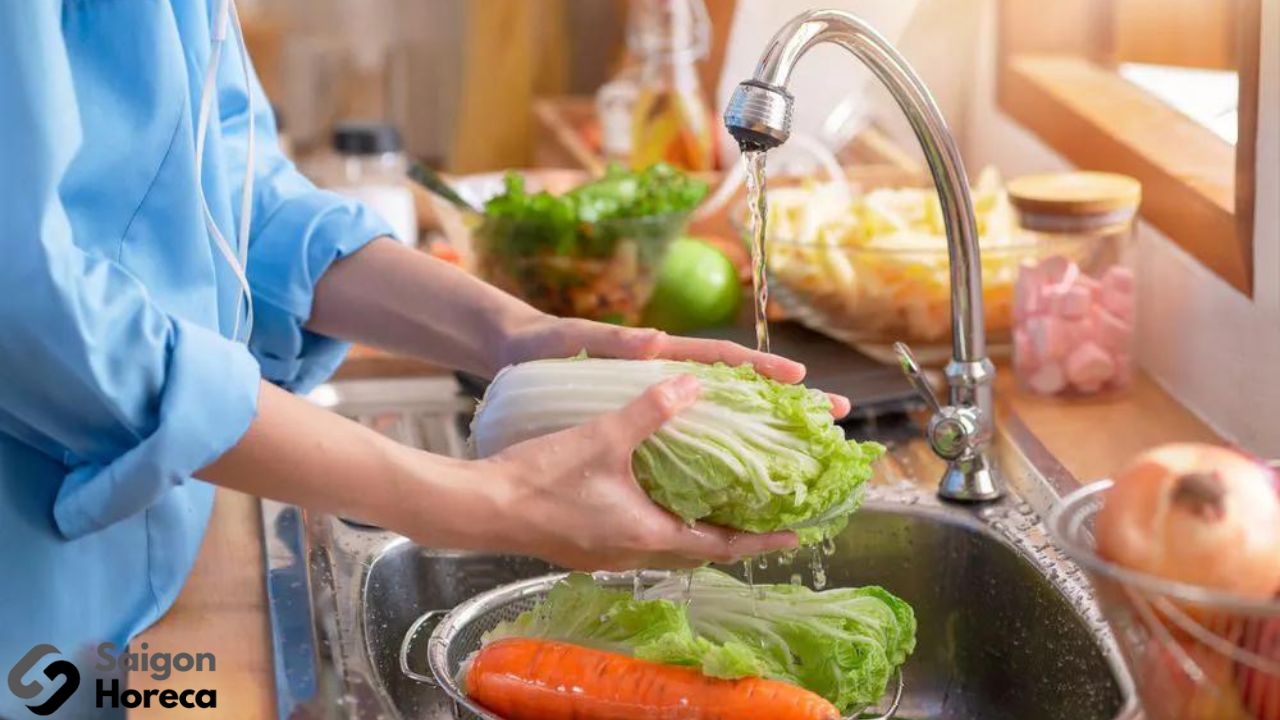

Preventing the Spread of Pathogens
Food preparation requires careful handling. Taking preventive measures during the food preparation process helps reduce the risk of food poisoning and ensures food safety. It’s crucial to refrigerate raw food immediately after purchase or preparation to prevent bacterial growth. Rinse fruits and vegetables with clean water or specialized produce wash before cooking. Use separate cutting boards and knives for raw and cooked food and always wash cutting boards and knives thoroughly between uses with hot, soapy water. Safely thaw food using a refrigerator, cold water, or a microwave, and once thawed, cook the food immediately to prevent bacterial growth.
By adhering to these food safety guidelines, we can ensure that the meals served in restaurants or industrial kitchens are safe and delicious. This reduces the risk of disease transmission and ensures the health of hundreds or even thousands of people each day.
Comprehensive Hygiene
Hygiene is the most critical factor in the kitchen environment to ensure food safety for everyone. The kitchen area must be kept hygienic throughout the day and particularly after each working session. This practice helps eliminate pathogens, bacteria, and infection risks while ensuring that food preparation and serving are safe.
All surfaces in the kitchen area, especially the food preparation and cooking areas, need to be cleaned regularly. After each use, the utensils and tools used for food preparation and cooking must be washed and disinfected with specialized dish soap to ensure no traces of food or bacteria remain. Dishcloths and scrubbing pads also require attention. They should be washed and air-dried after each use and replaced regularly to prevent bacterial growth.
The dishwashing sink is a potential source of contamination, so it should be cleaned and sanitized daily. This ensures that food and utensils are clean after each wash and ensures food safety for everyone.
Regularly Clean and Maintain Refrigerators or Cold Storage
Refrigerators, freezers, and cold storage are where various types of food are stored, and despite low temperatures, they can still become environments for bacteria and pathogens to thrive. This poses a risk of cross-contamination and can be harmful to human health. Therefore, cleaning and maintaining refrigerators and cold storage are crucial.
Regularly cleaning refrigerators or cold storage, especially when food spills or leaks onto the shelves, helps prevent bacterial and pathogenic growth. Organize food neatly and hygienically, and separate raw and cooked foods to limit cross-contamination.
Regular maintenance of refrigerators and cold storage, at least once a month, extends their lifespan and ensures their operational efficiency. This means better food preservation and safety. If any malfunctions occur during operation, food should be immediately transferred to alternative cold storage, and repairs should be made to prevent food loss and ensure food safety.
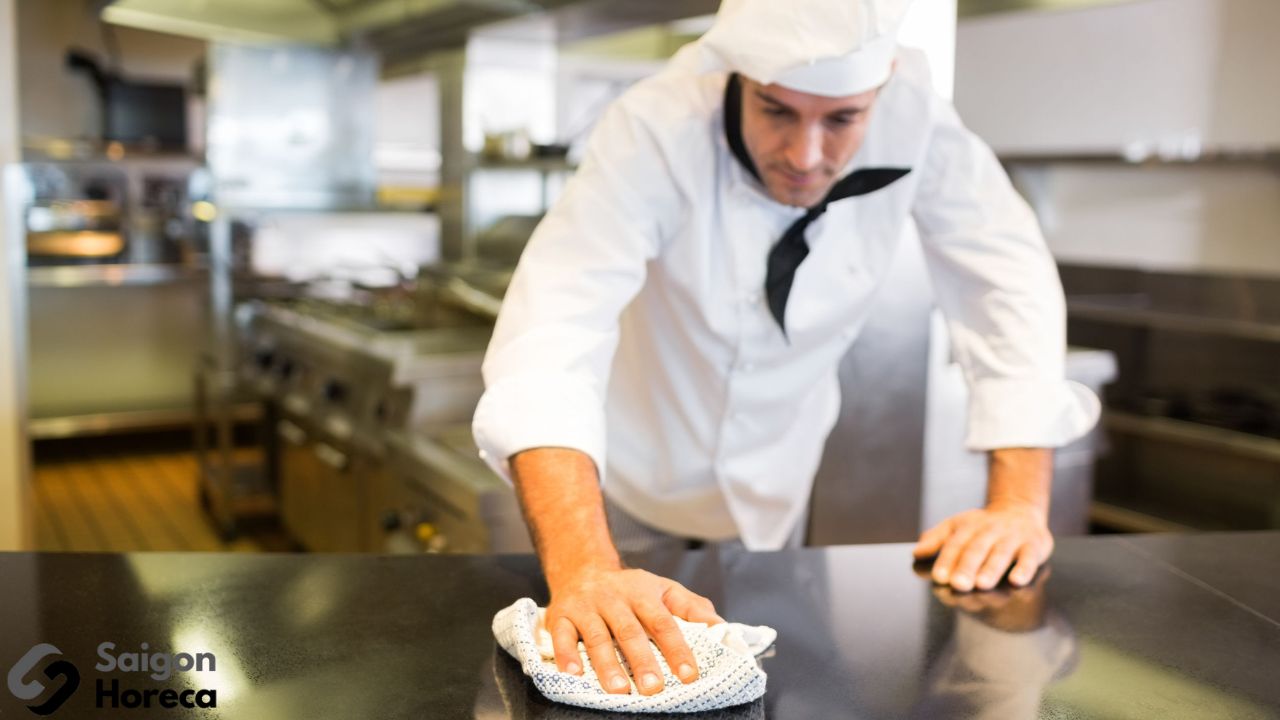

Proper Waste Management
In kitchen spaces, waste bins should be placed both inside and outside the area. These waste bins should meet standards, have tightly sealing lids, be equipped with wheels for convenient movement, and have foot-operated lid-opening mechanisms. Importantly, use trash bags inside these bins and empty them regularly, at least daily or when they become full.
Waste in the kitchen environment contains many harmful bacteria and germs. If not managed correctly, it can cause pollution and threaten hygiene in the kitchen space. Therefore, waste management is a vital and non-neglectable element.
Additionally, in the kitchen area, the wastewater drainage system should be installed to the correct standards. This helps ensure that liquid waste is processed quickly and efficiently, maintaining a clean and safe kitchen environment.
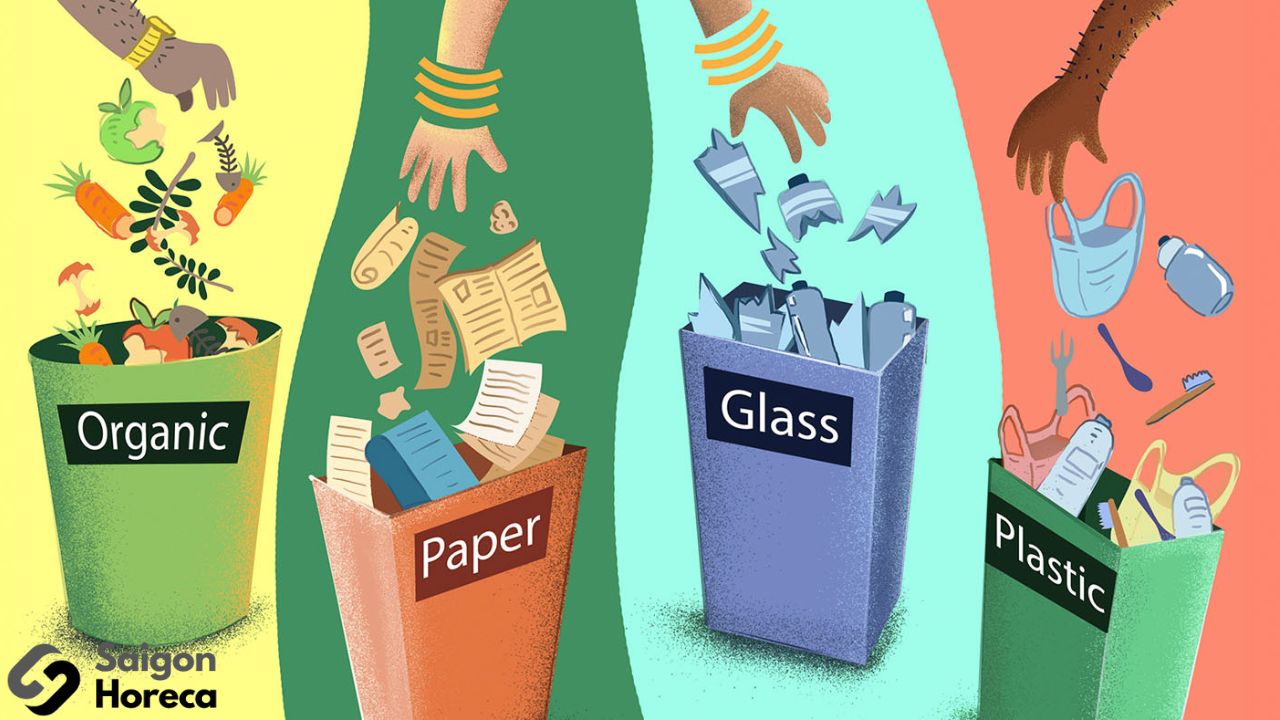

Ensuring the Appropriate Temperature for Food Preparation
When preparing food, especially meat, it is essential to ensure that the temperature reaches a level that is safe to kill bacteria and harmful pathogens. This is especially important to ensure that food is safe for consumers’ health. Food should be cooked thoroughly, and the temperature must reach a safe level, especially for raw foods like fresh meat, eggs, and seafood.
Fresh Produce Preparation
Before cooking or serving, the preparation of fresh fruits and vegetables is a crucial step to ensure food safety. They should be thoroughly rinsed with clean water to remove excess residues, bacteria, and dirt. Additionally, remove any damaged or rotten portions to prevent bacterial contamination of the remaining food.
Check the Use-By Dates on Packaged Foods
When using packaged foods, it is essential to check the use-by dates. Ensure that the food is still in good condition and safe for consumers’ health. Using food past its use-by date can pose a risk of bacterial contamination and be harmful to health.
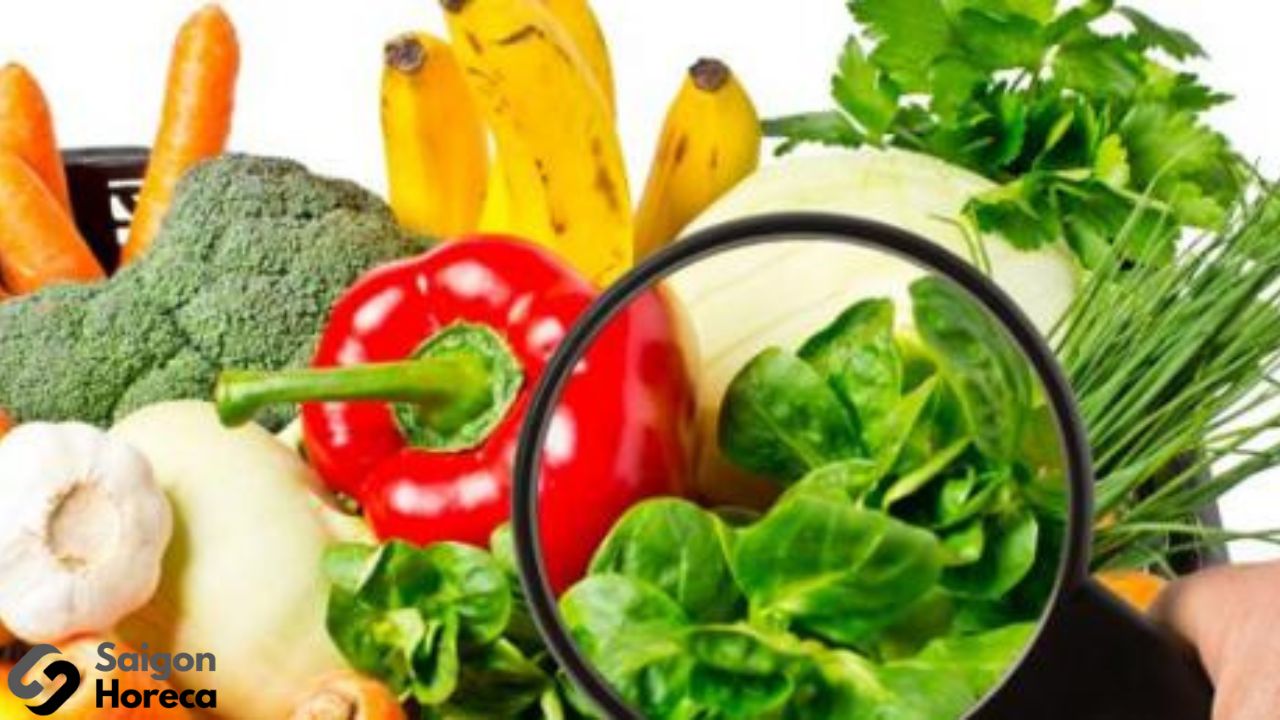

Saigon Horeca: Your Reliable Partner in Quality Stainless Steel Equipment Design and Manufacturing at Affordable Prices.
To ensure the efficiency of bar counter operations, equipping with essential equipment and sourcing from reputable and quality providers is crucial. Saigon Horeca is renowned as a specialized supplier and manufacturer of stainless steel equipment for kitchen and bar counters, offering products directly imported from overseas.
Saigon Horeca is committed to delivering high-quality products that meet all customer needs. Product quality is something that customers can have complete trust in when selecting products from Saigon Horeca.
One of Saigon Horeca’s strengths is their completely free consulting service for kitchen and bar counter design and equipment setup. Customers can have peace of mind with professional assistance and guidance to select products that fit the scale of their business.
Products from Saigon Horeca are crafted with precision and attention to detail, using modern and advanced technology. Quality is always a top priority, ensuring that the products meet all customer standards and requirements.
Pricing is carefully considered and designed to best fit customers’ budgets. Customers can trust that they are making a smart investment with kitchen and bar counter equipment from Saigon Horeca. With their experience in design consultation and product supply, Saigon Horeca has built a top-notch reputation in the market and earned high customer trust.
>>> Read on to better understand how HACCP can help ensure food safety in your workplace environment: HACCP Certification: What is HACCP? 7 Standards and Implementation of the HACCP System.
Monday - Friday
from 8h00 to 18h00
Số 40 Đường số 6, KDC Melosa Khang Điền, Phú Hữu, HCM.
Contact anytime
Mass catering kitchens are becoming increasingly popular and widely used in various organizations and institutions, including businesses, schools, hospitals, and […]
Read More
